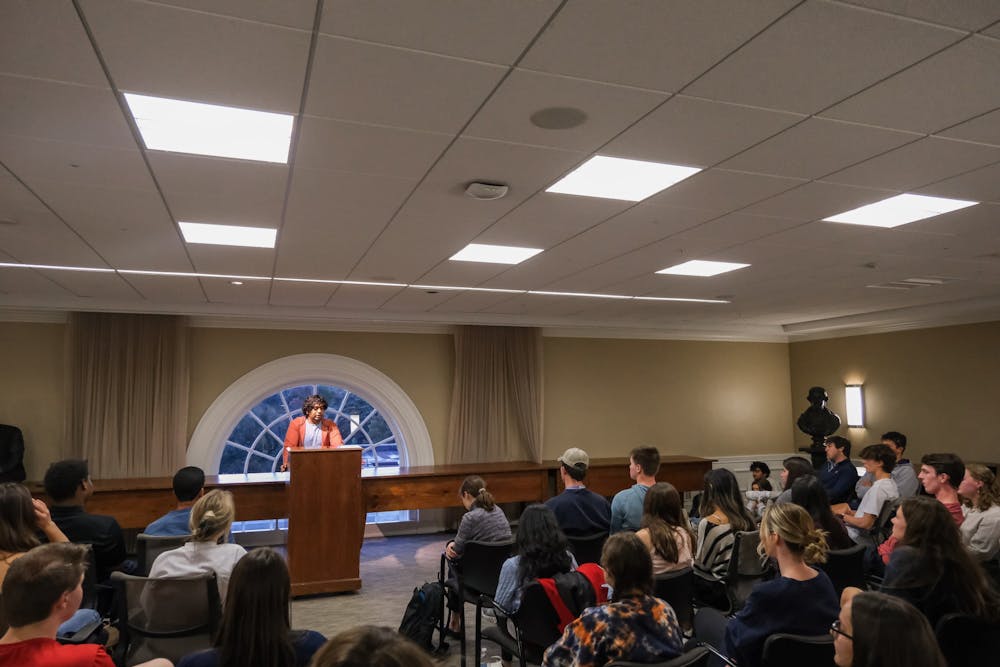中文版请点击此处
The University Judiciary Committee adjudicated eight cases between June 1 and Jan. 1, per the fall 2022 report released Wednesday. Six of the cases were individual students and two were organizations. Theta Tau, a contracted independent organization, and Delta Delta Delta sorority pled guilty to violating University hazing laws.
Eight-seven percent of the eight adjudicated cases resulted in a guilty plea or verdict. Half were violations of University policy and the other half were violations of federal, state or local law. Of the six student cases, five were undergraduate students and one was a graduate student. Five were male and one was female. The UJC does not release further details related to individual student cases to protect privacy.
Both Tri Delta and Theta Tau were originally found responsible for hazing by the University in July — when an organization is reported for hazing, the University first conducts an investigation process separate from the UJC. Severe hazing or hazing that threatens student health or safety may result in suspension or termination of the chapter’s agreement with the University. Otherwise, the dean overseeing the University investigation will refer the organization to the UJC for adjudication.
Tri Delta held a party in February in which new members of the sorority were scared into thinking the group had been reported for an alcohol violation, and told they would need to disclose who had reported the group. New members of Theta Tau were required to perform favors for brothers and were assigned derogatory nicknames or required to collect signatures in a public setting for a faked petition if they failed to complete the tasks.
Per the ruling from the UJC, both organizations have been permitted to continue operations and recruitment while implementing hazing preventative measures including implementation or modification of risk management chairs, modifications to club by-laws and, in the case of Tri Delta, a suspension in abeyance through Oct. 2025 should they violate hazing regulations again.
Daniel Tohti, president of Theta Tau during the UJC trial and third-year Engineering student, said that those responsible for hazing have either been removed from their leadership positions or from the fraternity entirely. While Tohti stepped down as president before the spring 2023 semester due to personal reasons, he was optimistic for Theta Tau’s future following the UJC trial.
“Since the trial, we have learned a lot through this process about responsibility and have been making great efforts to improve our fraternity and the recruitment process,” Tohti said in an email to The Cavalier Daily. “We believe that Theta Tau is now in a better position than it has ever been and are very excited for the new member class to join us.”
Emily Zucker, chapter president of Tri Delta and fourth-year College student, said that the sorority will use the verdict of the trial as a chance to reflect on their practices as well as those of Greek life as a whole.
“Our chapter has focused on education around risk issues such as hazing as well as an examination of traditions within the Greek community that do not portray our values,” Zucker said. “We are working collaboratively as a chapter and within the University community to be catalysts for change and improvement.”
Per Nabeel Raza, UJC Chair and fourth-year College student, the increased visibility of hazing on Grounds is primarily related to the codification of Adam’s Law in Virginia state law. The code requires that all Virginia higher education institutions, private or public, maintain public records of findings of violations relating to hazing incidents.
“I have seen and heard lots of anxiety surrounding the breadth of the hazing statute and the recent investigations and reports to the UJC for seemingly low-level offenses,” Raza wrote in the report. “While the UJC condemns all hazing as defined by the University, we do acknowledge that hazing has many levels of risk and therefore needs proportionate response.”
The University found that both Club Gymnastics and the University Guide Service engaged in hazing per a report issued earlier this month. In July, the University found five organizations guilty of hazing violations. Two fraternities — Phi Gamma Delta and Kappa Alpha — had their Fraternal Organization Agreements with the University revoked as a result of the report’s findings.
“There has been a trend towards more organizational cases since COVID, and that's an ongoing thing,” Raza said in an interview with The Cavalier Daily. “It's more to do with sort of trends within the University's reporting system than it does have to do with sort of violations. We have just become more adept at handling organizational cases, and therefore we're having a little bit more.”
UJC is a student-run organization of more than 110 students from each of the University’s 13 schools authorized to adjudicate and investigate alleged University policy violations brought by members of the academic or civic community. The report does not include the 22 cases that are currently pending or undergoing appeals.







